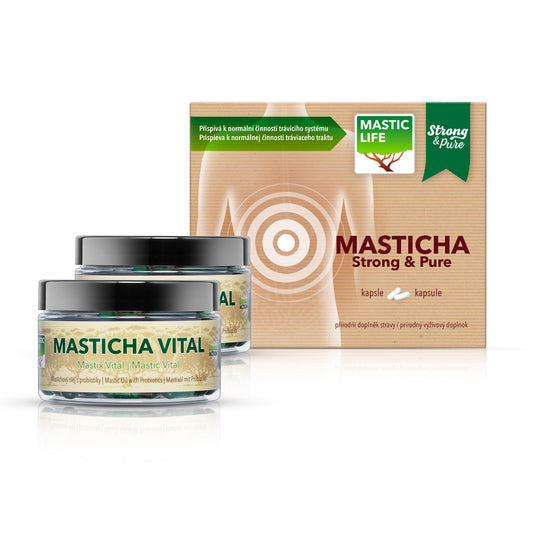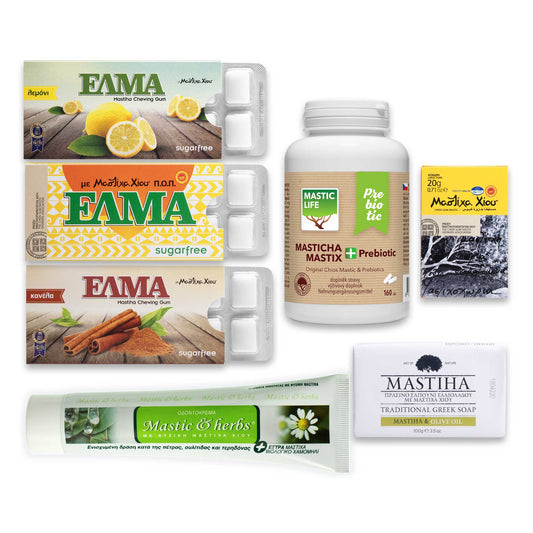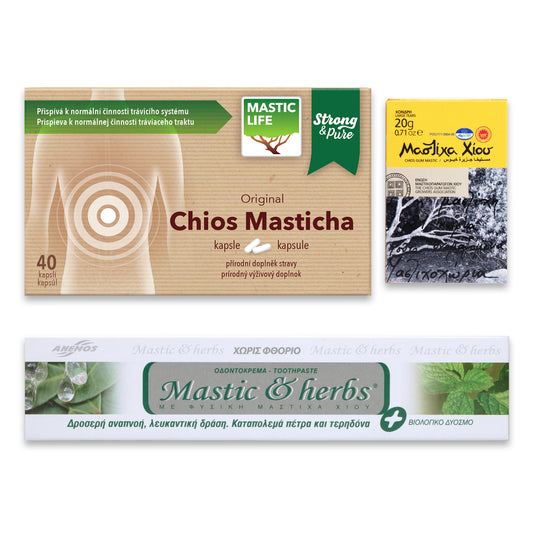Inulin: Carbohydrate, Polysaccharide and Fructan
Inulin is a polysaccharide from the fructan group, which is composed of mostly linear fructose chains with a terminal glucose. It is not broken down in the small intestine and enters the large intestine, where it is active as a prebiotic for intestinal bacteria and as a dietary fiber. Inulin is used as a dietary supplement, for determining kidney function and in the food industry. Possible adverse effects include digestive disorders, especially in sensitive people with intolerance.
Products
Inulins are commercially available, for example, in the form of capsules and as powder.
Masticlife offers dietary supplements with the highest quality PDO Chios mastic, which also contain inulin (read the ingredients carefully). These are:

Inulins should not be confused with insulins.
Structure and characteristics od inulin
Inulins are predominantly linear polysaccharides composed of numerous fructoses and containing terminal glucose molecules. The chain length is variable. The fructoses are linked β-glycosidically. Inulins are natural products found in many plants such as wheat, onions, Jerusalem artichokes, garlic, bananas, and asparagus. They are often extracted from the chicory root (Cichorium intybus).
Even masticlife dietary supplements use chicory root.
Effects
Inulin is a water-soluble dietary fiber that is not digested in the small intestine. Depending on the type, it has a slightly sweet taste. In addition, as a prebiotic, inulin promotes the growth of bifidobacteria and lactobacilli.
Fields of application of inulin
- As a dietary supplement, as a prebiotic.
- For the determination of renal function – inulin is exclusively filtered at the kidney and not secreted or reabsorbed.
- In the food industry.
Dosage
According to the package insert. Inulin is administered perorally as a dietary supplement.
Unwanted effects
Possible adverse effects include gastrointestinal disturbances such as flatulence, abdominal pain, and diarrhea.
Digestive disturbances occur primarily in sensitive individuals, for example, those with vegetable intolerance and fructose malabsorption.
Inulin is fermented in the large intestine by the bacteria of the intestinal flora and releases, among other things, short-chain fatty acids and gases such as methane, carbon dioxide and hydrogen.

FAQ about Inulin
Is inulin the same as insulin?
No. Inulin is a prebiotic dietary fiber from chicory root, while insulin is a hormone that regulates blood sugar. They are completely different substances.
Which Masticlife supplements contain inulin?
Masticlife combines inulin with PDO Chios mastic in products such as Mastic+ Prebiotic, Mastic+ Vitamin D3, and Mastic Comfort.
Can inulin cause side effects?
Yes. In sensitive individuals, inulin can cause digestive discomfort such as bloating, abdominal pain, or diarrhea, especially with higher doses.
Mastic for your gastrointestinal tract
-
 8-week treatment 🗓️
8-week treatment 🗓️Mastic 8 weeks
Regular price 337,00 PLNRegular price421,00 PLNSale price 337,00 PLNSale -
 60-day treatment 💪
60-day treatment 💪Mastic Gum Extra for 60 days
Regular price 599,00 PLNRegular price753,00 PLNSale price 599,00 PLNSale -
 Gift set 🎁
Gift set 🎁Mastic „Life with Mastic"
Regular price 250,00 PLNRegular price274,00 PLNSale price 250,00 PLNSale -
 Gift set 🌿
Gift set 🌿Mastic „Pure Mastic“
Regular price 129,00 PLNRegular price141,00 PLNSale price 129,00 PLNSale




